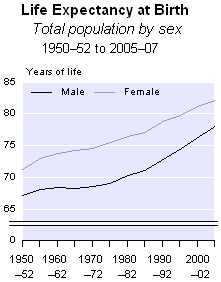Christchurch is now New Zealand's second largest city at 382,200 - surpassing Wellington, the capital city, by a mere 300 residents, Statistics NZ reports.
But this probably won't last long as Manakau City in the Auckland metro area is picked to wrest second largest title off Christchurch by 2011.
Over the longer term, the Auckland region will account for 62 per cent of the nation's population growth over the 25 years to 2031, adding 560,000 people to reach 1.93 million. The next highest population rises are expected to be seen in the Canterbury regions (101,000 more people), Waikato (64,000 more people), Wellington (63,000) and Bay of Plenty (61,000).
The projected growth in the Canterbury region echoes recent trends and reverses some longer term population drift from the South Island to the North.
Showing posts with label population. Show all posts
Showing posts with label population. Show all posts
Thursday, November 13, 2008
Wednesday, November 12, 2008
New Zealand Population Rises; 600,000 Overseas Kiwis
Statistics New Zealand reports that the population in New Zealand was 4.28 million at the end of September 2008.
An estimated 600,000 Kiwis live overseas, bringing the total number of New Zealanders close to 5 million.
On a population per head basis, New Zealand is only second in the world to Ireland in terms of its overseas population.
An estimated 600,000 Kiwis live overseas, bringing the total number of New Zealanders close to 5 million.
On a population per head basis, New Zealand is only second in the world to Ireland in terms of its overseas population.
Monday, November 10, 2008
Life Expectancy in New Zealand Rises
Source: Statistics New Zealand
The average life expectancy for a new born girl in New Zealand has risen to 82.2 years, while that for a new born boy has increased to 78 years. The increase since 2002 is larger for males, 1.7 years, than for females at 1.0 years. Statistics New Zealand's press release here.
On average, women can expect to outlive men by 4.1 years, a narrowing of the gap from its largest difference of 6.4 years in 1975-77.
New Zealanders' life expectancy rates are slightly below the OECD median of 82.3 years for females and somewhat above the OECD median of 77.2 years for males.
Two-thirds of the improved life expectancy is the result of a decline in death rates of those near the end of their work careers or in retirement (60-84 years). This trend is also apparent in longer term longevity improvements over the past thirty years (1975-2007).
The Maori life expectancy remains lower than non-Maori by about 8.2 years, but the difference has narrowed over the past decade from a gap of 9.1 years in 1995/97.
Life expectancy for Maori females was 75.1 years and 70.4 years for Maori males in 2005-2007.
Source: Statistics New Zealand
Higher rates of diabetes and smoking among Maori compared to non-Maori, and socio-economic factors, account for some of the lower life expectancy of Maori. Cause-of-death statistics show Maori have a six times higher rate of death from diabetes while the 2006 Census recorded that 42 percent of Maori over the age of 15 are regular smokers compared with an 18 percent rate for Non-Maori.
Maori infant mortality rates in the first year of life are 1.6 times higher than those for non-Maori.
Higher rates of diabetes and smoking among Maori compared to non-Maori, and socio-economic factors, account for some of the lower life expectancy of Maori. Cause-of-death statistics show Maori have a six times higher rate of death from diabetes while the 2006 Census recorded that 42 percent of Maori over the age of 15 are regular smokers compared with an 18 percent rate for Non-Maori.
Maori infant mortality rates in the first year of life are 1.6 times higher than those for non-Maori.
Subscribe to:
Posts (Atom)


